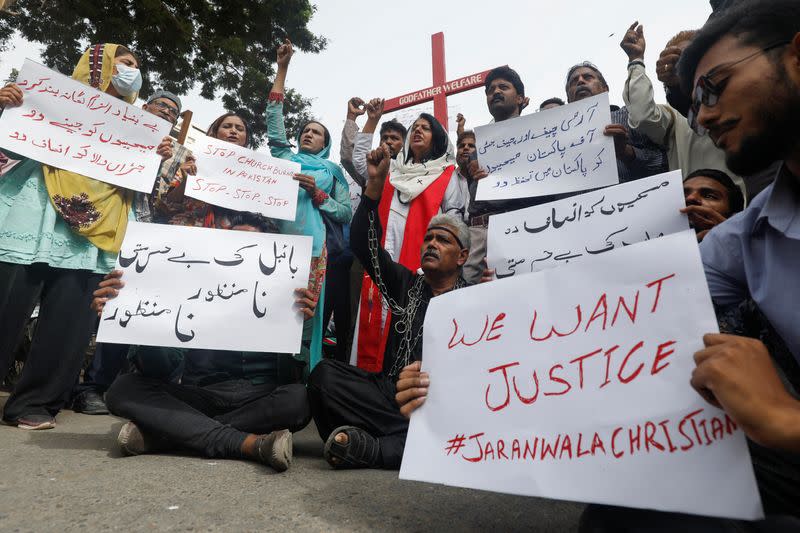Factbox-Pakistan's blasphemy law in spotlight after mob burns churches

, (Reuters) - Pakistan's blasphemy law has come under a spotlight after a Muslim mob burnt churches and houses in a Christian settlement in the east of the country, accusing two of its members of desecrating the Koran.
Critics say the law is often misused against Pakistan's tiny minority groups and even sometimes against Muslims to settle personal scores.
For the religious right, however, the blasphemy issue has become a rallying cause led by an Islamist political party that was formed after a provincial governor was gunned down by his bodyguard because the governor opposed the law.
Here are some points about the blasphemy law and its repercussions:
- The law seeks the death penalty for anyone who insults Islam and its prophet Mohammad. It says that any "derogatory remarks, etc., in respect of the Holy Prophet either spoken or written, or by visible representation, or by any imputation, innuendo or insinuation, directly or indirectly shall be punished with death, or imprisonment for life, and shall also be liable to fine".
- The law is rooted in 19th century colonial legislation to protect places of worship and was strengthened as part of a drive to Islamise the state during the military dictatorship of General Mohammad Zia ul-Haq in the 1980s.
- Although no one has ever been executed, blasphemy convictions are common in Pakistan. Most convictions are thrown out on appeal by higher courts, but mobs have lynched dozens of people in vigilante attacks even before a case is put on trial.
- Christians, who make up about 2% of Pakistan's 241-million population, have especially been at the receiving end of the blasphemy allegations.
Convictions hinge on witness testimony and often these are linked to personal vendettas, activists say.
- In February, a violent mob snatched a man accused of blasphemy from a police lock-up and lynched him in Pakistan's Punjab province where the latest upsurge of violence has taken place.
In 2021, a Sri Lankan manager of a garment factory was lynched in Punjab province over a blasphemy accusation.
- The religious right has consistently blocked attempts to reform the law or even repeal it. Authorities say the law actually works as a shield for anyone accused of blasphemy, arguing that repealing it altogether will give Islamists a license to kill.
- The Tehreek-e-Labaik Pakistan (TLP) which was formed as a political party following the assassination of Punjab governor Salman Taseer by his bodyguard has been leading the campaign in support of the law.
The TLP, which took part in the 2018 national election has held protests leading to clashes with law enforcement agencies. The group has since been outlawed but government sources and residents said some of its members were involved in the violence this week. The group denied the allegation.
(Compiled by Asif Shahzad)

